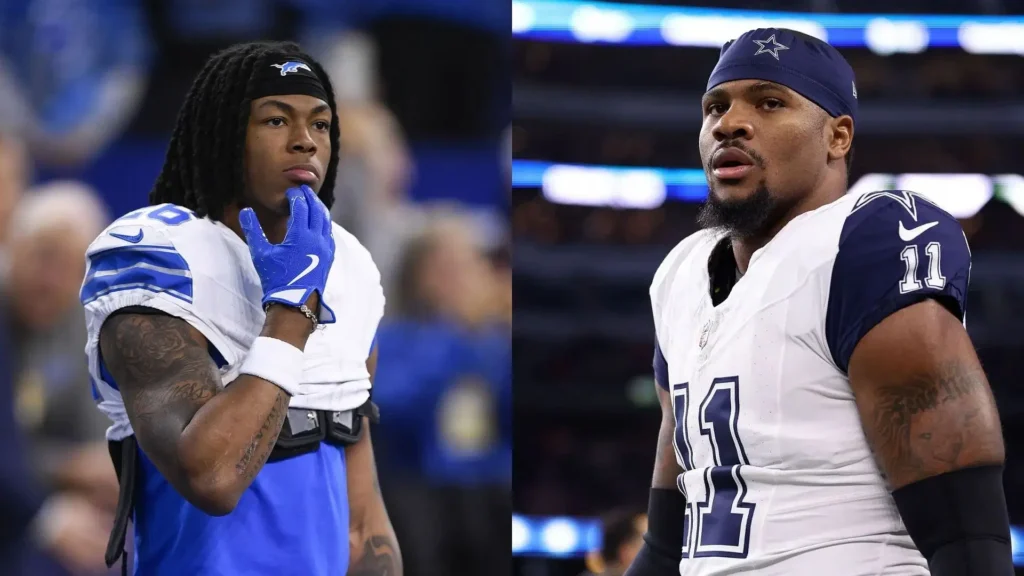Cowboys Star Micah Parsons Takes Issue with Jahmyr Gibbs Slamming ‘Sick’ $10,000,000,000 Franchise
The National Football League (NFL) is no stranger to controversy, and the latest involves Dallas Cowboys’ defensive superstar Micah Parsons and Detroit Lions’ rookie running back Jahmyr Gibbs. What started as a simple statement spiraled into a debate about respect, team loyalty, and the business of professional football.
The Controversial Comment
Jahmyr Gibbs recently commented on the NFL’s financial dynamics, allegedly calling the league’s $10 billion valuation “sick” in a way that many perceived as critical. While Gibbs may have intended to highlight the massive economic disparity between players’ earnings and franchise valuations, it struck a nerve with Micah Parsons, who was quick to voice his disagreement.
Parsons, known for his fiery personality both on and off the field, defended the NFL’s business model, arguing that the league’s success stems from hard work and fan loyalty. “When you play for a billion-dollar franchise, you carry the weight of its legacy. Criticizing that system feels disrespectful,” Parsons said during a recent interview.
The Bigger Picture: Money and the NFL
The NFL’s financial ecosystem is a complex web of revenue sharing, player contracts, and fan-driven income. With franchises like the Dallas Cowboys valued at over $10 billion, questions often arise about how much of that wealth trickles down to players. While stars like Micah Parsons earn millions annually, the average NFL career lasts just 3.3 years, making financial security a pressing concern for most players.
Jahmyr Gibbs’ remarks touched on these disparities, albeit indirectly. Critics argue that rookies like Gibbs should focus on their performance rather than business commentary, especially in their first year. Supporters, however, believe that players have every right to question the system that benefits owners disproportionately compared to athletes who risk their health every game.
Player Perspectives: A Divided Locker Room?
Micah Parsons’ public reaction raises questions about locker room dynamics. While veterans often emphasize loyalty and respect for the league, younger players may feel emboldened to challenge the status quo. Could this generational divide create friction within teams?
Former players have also weighed in. Hall of Famer Shannon Sharpe defended Gibbs, stating, “It’s not wrong to ask questions about fairness. The NFL wouldn’t exist without its players.” Conversely, others, like Michael Irvin, sided with Parsons, arguing that maintaining respect for the league is essential to its longevity.
The Role of Media in Escalating Controversies
Media scrutiny plays a significant role in amplifying such incidents. What might have been an innocuous comment by Gibbs turned into a full-blown controversy due to relentless coverage. Social media platforms further fueled the debate, with fans taking sides and creating viral hashtags like #TeamParsons and #TeamGibbs.
Lessons from the Controversy
- Respect Goes Both Ways: While players should respect the league’s structure, the NFL must also ensure fairness in revenue distribution.
- Freedom of Speech vs. Team Loyalty: Players’ comments often reflect broader concerns but must balance individual expression with team dynamics.
- The Role of Leadership: Coaches and team leaders play a vital role in maintaining harmony amidst such controversies. Addressing these issues internally before they escalate can prevent unnecessary distractions.
Looking Ahead
The Parsons-Gibbs saga highlights ongoing debates about player empowerment, wealth distribution, and loyalty in professional sports. While Micah Parsons and Jahmyr Gibbs may eventually resolve their differences, the larger issues remain unresolved. As the NFL continues to grow, it must navigate these challenges to ensure a harmonious relationship between its billion-dollar franchises and the athletes who make them successful.
This controversy is a reminder that the NFL isn’t just about football; it’s a microcosm of broader societal issues, from wealth inequality to freedom of expression. As fans, we can only hope that the league and its players find a way to balance these competing interests for the greater good of the sport.

